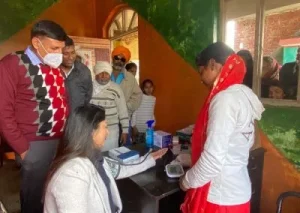- info@satyashaktifoundation.org
- Mon - Sat: 09.30 AM - 06:30 PM
Online Doctor Consultation for rural Indians
admin
19 July 2022
No Comments
Online Doctor Consultation For Rural Indians

Well over the past decade, India has achieved considerable progress in improving the wellness of its people, narrowing the difference between countryside and urban regions, as well as between the rich as well as the poor. Yet, large discrepancies persist, and accessibility to treatment in rural regions remains a major concern. A one-day National Consultation must have been held as part of the World Rural Health Conferences to exchange skills and knowledge from encounters and findings of rural basic healthcare in India and around the world, to discover features that could influence advances in rural India’s treatment. This article presents the findings on what succeeds for rural basic care but then makes suggestions for improving healthcare through the Best NGO services in rural India based on the debates.
Best Doctor Consultation For Rural Indians
Meanwhile, large discrepancies persist, and accessibility to treatment in rural regions remains a major concern. There seems to be a growing consensus in India that perhaps the country has to have a robust integrated primary healthcare infrastructure to achieve additional improvements in population health and minimize inequities.
The National Health Policy of 2016 and also the Ayushman Bharat budgeting bulletins for the year 2018 have 2 parts for trying to strengthen healthcare too in India: enhancing entry and reliability of primary healthcare by enhancing 1, 50,000 sub-centers as well as primary health centers (PHCs) [converting them to fitness & wellbeing centers (H and WCs)] and enhancing entry to secondary or tertiary care by implementing a near-universal health reimbursement scheme.
India’s economy is booming, rural facilities are developing, and the country has access to cutting-edge technologies, all of these can improve the country’s population’s wellness. Several state administrations have devised and adopted novel solutions to the concerns of healthcare availability and affordability.
Many non-profit groups like Satya Shakti Foundation working in hard-to-reach rural areas have innovated to enhance primary medical access, attentiveness, and quality. There are indeed significant, long-term achievements of numerous countries that have handled the difficulty of providing universal, high-quality basic healthcare to the world’s poorest people.
These lessons can help India’s policymakers make better decisions. A one-day National Consultation must have been organized to share skills and knowledge from rural primary medical perspectives and information from India and throughout the world, as well as to identify factors that could drive India’s attempts to improve healthcare across remote and underserved regions. The discussion was conducted in conjunction with the World Rural Healthcare Conference 2018, which took place in New Delhi from April 26 to 29, 2018.
Training of rural healthcare professionals
According to data from around the world, such care is best offered by workers (particularly nurses and doctors) who have been trained in extensive healthcare and therefore are mentally geared to provide a full range of treatments to the rural population. Doctor consultation Such training must take place within rural health facilities, with trainees integrated into rural populations, to be successful.
Thus a generalist strategy for primary healthcare Health providers in rural locations must provide a wide range of services to people at all stages of life for a variety of ailments. As a result, they must possess a diverse set of clinical, sociological, and leadership abilities. Medical as well as nursing education is currently concentrated in specialized tertiary care facilities and is aimed solely toward delivering care in those settings.
Recent Comments
No comments to show.
Subscribe
Subscribe to our newsletter for the latest update.
Contact Us
- DPT 004, Ground Floor, DLF Prime Towers, Block- F, Okhla Phase-1, New Delhi- 110020 India
- +91-011 408 45450
- info@satyashaktifoundation.org
- Mon - Sat: 09.30 AM - 06:30 PM
-
© Copyright 2023 SATYA Shakti Foundation, All Rights Reserved. Developed By Kitoinfocom Pvt Ltd



Leave a Reply